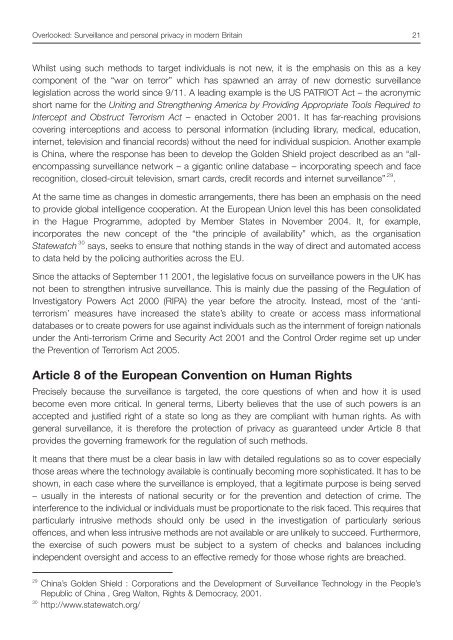Overlooked - Liberty
Overlooked - Liberty
Overlooked - Liberty
Create successful ePaper yourself
Turn your PDF publications into a flip-book with our unique Google optimized e-Paper software.
<strong>Overlooked</strong>: Surveillance and personal privacy in modern Britain 21<br />
Whilst using such methods to target individuals is not new, it is the emphasis on this as a key<br />
component of the “war on terror” which has spawned an array of new domestic surveillance<br />
legislation across the world since 9/11. A leading example is the US PATRIOT Act – the acronymic<br />
short name for the Uniting and Strengthening America by Providing Appropriate Tools Required to<br />
Intercept and Obstruct Terrorism Act – enacted in October 2001. It has far-reaching provisions<br />
covering interceptions and access to personal information (including library, medical, education,<br />
internet, television and financial records) without the need for individual suspicion. Another example<br />
is China, where the response has been to develop the Golden Shield project described as an “allencompassing<br />
surveillance network – a gigantic online database – incorporating speech and face<br />
recognition, closed-circuit television, smart cards, credit records and internet surveillance” 29 .<br />
At the same time as changes in domestic arrangements, there has been an emphasis on the need<br />
to provide global intelligence cooperation. At the European Union level this has been consolidated<br />
in the Hague Programme, adopted by Member States in November 2004. It, for example,<br />
incorporates the new concept of the “the principle of availability” which, as the organisation<br />
Statewatch 30 says, seeks to ensure that nothing stands in the way of direct and automated access<br />
to data held by the policing authorities across the EU.<br />
Since the attacks of September 11 2001, the legislative focus on surveillance powers in the UK has<br />
not been to strengthen intrusive surveillance. This is mainly due the passing of the Regulation of<br />
Investigatory Powers Act 2000 (RIPA) the year before the atrocity. Instead, most of the ‘antiterrorism’<br />
measures have increased the state’s ability to create or access mass informational<br />
databases or to create powers for use against individuals such as the internment of foreign nationals<br />
under the Anti-terrorism Crime and Security Act 2001 and the Control Order regime set up under<br />
the Prevention of Terrorism Act 2005.<br />
Article 8 of the European Convention on Human Rights<br />
Precisely because the surveillance is targeted, the core questions of when and how it is used<br />
become even more critical. In general terms, <strong>Liberty</strong> believes that the use of such powers is an<br />
accepted and justified right of a state so long as they are compliant with human rights. As with<br />
general surveillance, it is therefore the protection of privacy as guaranteed under Article 8 that<br />
provides the governing framework for the regulation of such methods.<br />
It means that there must be a clear basis in law with detailed regulations so as to cover especially<br />
those areas where the technology available is continually becoming more sophisticated. It has to be<br />
shown, in each case where the surveillance is employed, that a legitimate purpose is being served<br />
– usually in the interests of national security or for the prevention and detection of crime. The<br />
interference to the individual or individuals must be proportionate to the risk faced. This requires that<br />
particularly intrusive methods should only be used in the investigation of particularly serious<br />
offences, and when less intrusive methods are not available or are unlikely to succeed. Furthermore,<br />
the exercise of such powers must be subject to a system of checks and balances including<br />
independent oversight and access to an effective remedy for those whose rights are breached.<br />
29<br />
China’s Golden Shield : Corporations and the Development of Surveillance Technology in the People’s<br />
Republic of China , Greg Walton, Rights & Democracy, 2001.<br />
30<br />
http://www.statewatch.org/















